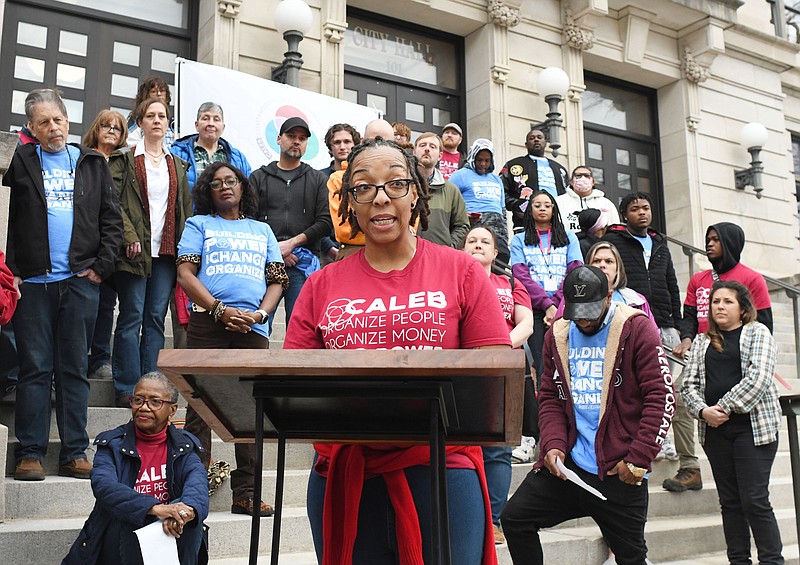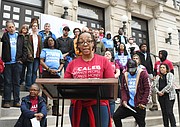The statistics paint a dire picture.
Between 2016 and 2021, one out of every four rental homes became unaffordable to households earning $35,000, according to data from the group Chattanoogans in Action for Love, Equality & Benevolence. Since 2021, the cost of rent has increased 30% — outpacing the 13% growth in household incomes.
(READ MORE: Chattanooga churches answer the call: Affordable housing initiatives in action)
Now, community members are hoping city leaders can do something about it. Chanting "homes for all," members of CALEB stood on the steps of City Hall on Thursday evening to call on Chattanooga leaders to follow through with policy goals outlined in an affordable housing action plan released by Mayor Tim Kelly's office in August.
"I live in Highland Park just a few miles from here, where a lot of my neighbors who have lived in that neighborhood for decades, especially people of color, are being priced out," April Berends, the rector of Grace Episcopal Church, said during the news conference.
Specifically, they want the city to dedicate a consistent revenue stream for an affordable housing trust fund, form a local mortgage pool to expand access to homeownership and use public subsidies to increase citywide housing options. They're urging community members to speak in support of these measures at the upcoming City Council meeting at 3:30 p.m. Tuesday at 1000 Lindsay St. More information is available at calebcha.org/housing.
"People in my community, in my neighborhood, in my church are struggling to make rent — young people, elders who have worked hard their whole lives," Berends said. "Finding affordable housing is nearly impossible for low-income workers and often even for middle-class workers."
The housing crisis is especially stark for African Americans. Black households making $100,000 a year have a higher mortgage denial rate than a white household earning $35,000, according to the Hope Policy Institute.
Janice Gooden, co-chair of the organization's economic mobility task force, said CALEB has hosted community meetings about the mayor's 101-page strategy.
"In the time since its release, there's been little public discussion of the details of the plan," she said during the event. "We agree with the city that the first proposed action is the most important. Chattanooga needs a dedicated revenue stream for affordable housing."
Federal funding for housing is woefully inadequate, she said.
"This is a message of hope," Allen Shropshire, a community organizer with CALEB, said at the news conference. "Our community can make the decisions that significantly expand housing opportunities for the majority of people."
(READ MORE: What will the city's new affordable housing plan mean for Chattanooga taxpayers?)
What is the city doing?
Chattanooga's chief housing officer, Nicole Heyman, said she appreciates CALEB coming alongside the city to call for these policies. Everyone knows the city needs to reserve money for affordable housing, she said, which could come from multiple sources.
"It's budget season, so we'll see," Heyman said in an interview after the news conference. "But we are dedicated to finding some funding for affordable housing."
Federal funding only goes so far, she noted. The city doesn't receive much of it, and the money comes with significant restrictions. Local funding could, for example, help landlords repair or update substandard rental housing, Heyman said.
Kelly's office also intends to approach the Chattanooga City Council about changing local policies that make it harder to use tax incentives to fund affordable housing projects. For example, city rules prevent the use of tax increment financing for affordable housing projects — something that is permitted under state law.
"That's something we are definitely going to approach the City Council to change — soon I hope — because we need every tool in the toolkit," Heyman said.
Tax increment financing is one of several strategies local governments use to spur economic development. It's particularly effective in blighted, undeveloped areas. As property values go up, officials take the increase in property tax revenue and reinvest it into the project.
The mayor's office also intends to propose changes to the tax cuts it offers for housing projects, which would offer developers an incentive to include affordable units in their projects. Heyman expects that will go to the City Council in March.
On top of that, state Sen. Todd Gardenhire, R-Chattanooga, is sponsoring a bill that would allow governments in Tennessee to offer density bonuses for developers in exchange for them building more affordable housing.
Specifically, that would mean builders could construct more units than local governments would ordinarily permit on a piece of land, allowing them to make up any shortfalls caused by lower-priced housing, according to the city. Governments could also require fewer parking spaces in a project and reduce setbacks to fit in more housing.
"Fingers crossed that'll get passed," Heyman said. "That bill is critical. We've got great support from across the state."
Given the rising cost of labor, materials and red tape, no developer can afford to build new homes at a comfortable price range for poor Tennesseans, Kelly said in a news release last week.
"Without voluntary incentives to either decrease construction costs or increase the project's overall revenue, new homes will remain out of reach for too many, including many paramedics, teachers and bus drivers," Kelly said.
Contact David Floyd at dfloyd@timesfreepress.com or 423-757-6249.

